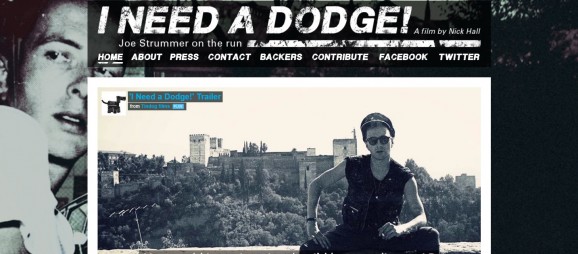I Need a Dodge – Joe Strummer in Spain

Here at the Andalucia.com blog, we're always interested in quirky stories about the British in Andalucia, such as an English soldier who fought against Napoleon for Spain, buried near Seville, a certain Mr Henderson's railway from Algeciras to Ronda, and Laurie Lee's fabled journey in the 1930s.
Not so long ago, a square in Granada was named after Joe Strummer, founder and lead singer of The Clash, described as "one of the most overtly political, explosive and exciting bands in rock and roll history". Strummer visited Spain on numerous occasions in the 1970s and 1980s, and was quoted as saying that he wanted to give up music and open a ferreteria in Granada.
Now a Barcelona-based British indie film director, Nick Hall, has made a film about Joe Strummer in Spain, based around the American Dodge car he lost in a Madrid car park in 1986. The documentary is called I Need A Dodge! and looks at Strummer's sojourns in Spain.
Nick Hall explains how the idea for the film first came about: "Soon after I started investigating Joe Strummer’s ‘refuge’ in Spain in 1984/5, I heard a recording of an interview on Spanish national radio from the 1990s. In the interview Joe talks about a car he had in Madrid some years earlier. One day he left the car in a car park but couldn’t remember which one. And there it stayed. In the interview Joe appeals to the Spanish people to help him find his car. I couldn’t help wondering what had happened to Joe’s Dodge and what he was doing in Madrid without the rest of The Clash. I thought I’d dig around a bit…"
Hall explains about the effect the musician had on Spanish people: "Joe Strummer touched many people's lives in Spain during this period. He became friends with the biggest stars in Spanish music and produced an LP for a local Granada punk band [called 091]. Everyone I have interviewed for the film tells an interesting, and sometimes funny, tale of their time with a rock star at a crossroads in his life. I believe it’s a story that needs to be told and an investigation that needs to be completed – just in case!"
The film features interviews with members of 091, Radio Futura (a famous Spanish rock band, which Strummer asked to help him buy the Dodge) and The Clash, as well as some of Joe’s closest friends.
Hall also reveals that Strummer "spent months on end here; over a year and a half period he was here more than he was back in London." "I had this image in my head of Joe Strummer going off to dig up [Spanish poet and radical Federico Garcia] Lorca and discovering – the contrast would be huge. It’s difficult to imagine now, the contrast between the life with the Clash – he’d been playing in Shea Stadium – compared with life in Andalucia in 1984."
Strummer first visited Spain in the 1970s, the filmmaker says: "Before [the Clash] he lived in a squat with two sisters from Malaga. He had a girlfriend from Malaga [Paloma Romero], who went on to become the drummer from the Slits. That is the connection. Richard Dudanski, who was his big friend, they had a Romero sister each, and they all traveled to Malaga in ’73 or something. They’d talk about Lorca. [Dictator Francisco] Franco was still in charge then. He was very interested by Spanish culture and politics. Spanish Bombs would have come out of that. And once the Clash was falling apart and he needed to run somewhere, he went back."
Here are the lyrics from Spanish Bombs, about the Spanish Civil War, which was on the band's massively successful album London Calling:
Hall comments on the Clash's huge popularity in Spain: "Well, he sang about Spain. Can you imagine? Spain wasn’t on the map then, in terms of British-American rock music. And there’s only so much flamenco and copla a young person can take. Young Spanish people were listening to what everybody was listening to. There was a punk movement. The bands that were coming out of the young crowd were influenced by the British bands more than anything, and for one of them – one of the most important – to be singing about Spain, that would be massive. They only played three gigs in Spain, ever [in 1981], but it feels like they were always much closer to Spain. Those three gigs left a mark."
* These quotes are from an interview on musicfilmweb.com
Here is the trailer for the film: